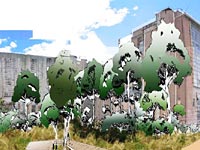| Landscape Architecture - 3380 |
|
||||||||||||||||||||||||||||||||||||||||

Program Summary
The Bachelor of Landscape Architecture program is of four years duration and requires full-time attendance throughout. Students are introduced to the theory and practice of landscape architecture through an exploration of design principles, graphic techniques, ecological processes and studies of human modification of the environment. As students progress through the program, increasing emphasis is laid upon creative design with particular application to Australian conditions. Projects are related to the subject matter of concurrent lectures and culminate in landscape studies of regional and national significance.
The majority of courses are taught specifically within the Landscape Architecture Program. However, contact with the students and staff of other programs is ensured by the inclusion of courses from other programs in the Faculty of the Built Environment, the University's General Education program and the program of elective courses. In the final two years of the program students are able to undertake a significant component of elective courses from the Landscape Architecture Program, other programs within the Faculty or from other faculties, which effectively allows them to develop a major specialisation. Program Objectives and Learning Outcomes The program seeks the synthesis of knowledge and skills through project based learning in a sequence of eight Design Studios. Support courses are grouped into strands: environment, history and theory, communication, technology and practice.
Year 1
Session 1 Session 2
Year 2
Session 1
Session 2
See course description for LAND1222.
Additional Requirement (completed before the start of Year 3)
Year 3
Session 1
Session 2
Additional Requirement
(completed before the start of Year 4)
Year 4
Session 1
or
and
Session 2
The Bachelor of Landscape Architecture degree may be awarded with honours based upon the quality of performance in the program and in accordance with current program policy. Honours are Class 1 or Class 2 Division 1 or Class 2 Division 2.
1. The degree of Bachelor of Landscape Architecture is awarded at either Pass or Honours level after the successful completion of a minimum of 216 units of credit.
2. To fulfill these requirements, students must complete:
3. The standard duration of the program is 4 years consisting of 8 semesters of full-time study (24 units of credit per semester) plus the required work experience.
4. General Education courses may not be taken before a student enters Year 2 of the Program. 5. Students who achieve a final mark above 65 in the prerequisite course, LAND1321 Research Methods, will be directed to the Landscape Thesis, and those who pass LAND1321 but whose final mark is 65 or less will be directed to the Advanced Research Project in Landscape Architecture. Students doing the Research Project will also be required to enrol in the co-requisite, Landscape Design 9: Integrated Studio. 6. A Progress Portfolio will be submitted at the end of second year as part of the assessment for LAND1202 and to determine progression into the third year of design. Similarly, another Progress Portfolio will be submitted at the end of third year which will determine progression into the final year of design. 7. Design Studios are considered to be a linear sequence, which requires that each design studio must be passed before a student can advance to the next level. Work Experience
Students of the undergraduate program must obtain a total of 90 days work experience prior to graduation, of which a minimum of 40 days must be in landscape industry work and a minimum of 40 days in a landscape design office. This normally takes the form of employment during long student vacations supervised by a landscape architect, landscape contractor or nursery. Each student undertaking work experience must obtain prior approval of the Work Experience Co-ordinator.
Each student must obtain from the employer a statement of experience gained, maintain an accurate record in logbook form and submit a written report describing the work undertaken during the various work experience components. Details of these arrangements are available on the Faculty website. For information regarding fees for UNSW programs, please refer to the following web-page: https://my.unsw.edu.au/student/fees/FeesMainPage.html
The program is accredited by the Australian Institute of Landscape Architects and graduates holding the BLArch degree may qualify for corporate membership of the Institute.
Area(s) of Specialisation |
|||||||||||||||||||||||||||||||||||||||||

| Contacts | Library | myUNSW | WebCT |